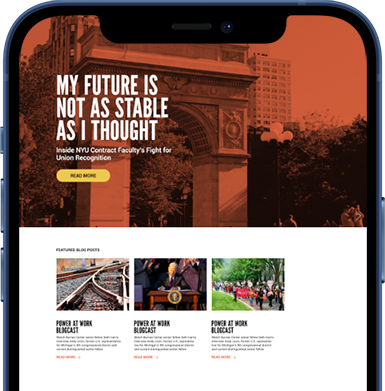As a new and emerging industry, cannabis is a case study in modern-day collective action. Companies involved in cannabis, from farms to dispensaries, are making billions of dollars as more states legalize their products. The problem: as the industry expands, so has cannabis workers’ need for union representation.
From an outsider's perspective, the cannabis industry is shrouded in unknowns. Questions about working conditions, industry regulation and worker safety have been on the rise. Unions like the Teamsters and the United Food and Commercial Workers (UFCW) hope to provide the answers. By empowering cannabis workers in their workplaces, they believe increased transparency, accountability, and better lives and careers for cannabis workers will follow.
Though cannabis organizing has been occurring on the West Coast for several years, in the East, it’s significantly newer. In August 2022, employees of Boston’s Ascend became the first dispensary workers in New England to unionize with Teamsters Local 25. In a statement, Teamsters Western Region Vice President and Director of the Food Processing Division Peter Finn said, “our goal is to ensure cannabis jobs turn into a career. This is a great organizing victory in Boston, but our fight doesn’t end there.”
By bargaining for higher wages and better benefits, unions hope to ensure long-term employment for their members and their co-workers—moving the needle of cannabis employment from “job” to “career.” “The way that a lot of companies see workers is that they’re going to come in, work a couple of years and give really good labor, then get burnt out and leave,” said Jack Fell, communications director for UFCW Local 1445. “But the way we see it, the way workers deserve it, is that if they have a job at a cannabis growing facility or dispensary, they deserve to be able to work their 40 hours, have enough money to pay rent, live comfortably, have health care and dental care and insurance. Everything that people need to survive and live comfortably.”
Chris Smith—a business agent for Teamsters Local 777—agreed. “There are a lot of people who want to stay lifelong cannabis workers. And right now, with the turnaround rate as high as it is, that’s not seeming to be possible,” he said. The goals associated with organizing cannabis workers, Smith outlines, are not only job security, but retirement benefits and guaranteed wage increases.
Before working at the Teamsters, Smith was employed by Verilife, a cannabis dispensary in Romeoville, Illinois. He was originally drawn to the career “to help individuals,” he explained. “I mean that in every way that I can. Either by giving them an alternative choice or just giving them relief in their day through the use of cannabis. I ended up staying in the industry because I did find that was the case.”
Smith isn’t alone in that view of cannabis. The assumptions attached to cannabis workers eclipse the passion and dedication of its workforce, Smith explains. “These are some of the most educated workers I have come across in many different types of industries. Overall, the individual that you see in your dispensary is not a clueless, dim-witted person. Nine times out of ten they are some of the most intellectual people you will meet. A lot of these people have left other jobs because of medical reasons and cannabis was their fallback… a lot of these individuals look at cannabis as something that helped them save their life. And with that they want to see it as long term, and don’t want to bounce from employer to employer.”
Smith spearheaded his store’s organizing campaign, which resulted in employees voting to join the Teamsters in December 2021. Some of the issues that drove them towards unionization are common across the industry and in other retail businesses: low pay, lack of a set schedule, and a need for retirement and healthcare benefits, among others. One issue that was unique to this emerging industry, however, was a lack of communication as cannabis corporations grew.
“These corporations are becoming the strong holders of the industry, they’re moving in multiple states. And so, to get a direct line of communication to the decision makers at the top, it became a lot more difficult as the mom-and-pop shops started to get taken over,” said Smith. “So, the only way to have an efficient way of communicating, of describing what we needed, was the Teamsters.”
Beyond employment benefits and workplace communication, cannabis has seen a unique rash of workplace safety issues as the industry has grown. In January 2022, Lorna McMurrey—a 27-year-old employee of the Florida-based cannabis company Trulieve—died due to an inability to breath after inhaling cannabis dust while working at Trulieve’s cultivation facility in Holyoke, Massachusetts.
Her death served as a lightning-rod for cannabis oversight in the region and laid bare the need for union representation in the industry. “We’re seeing the lack of regulations and the lack of safety, the lack of protections for these workers really coming into play,” said Fell. “There’s a lack of PPE for people working in [cultivation facilities], which are really dusty and dangerous… a lot of times these workers are working 10-hour shifts cultivating, and that can be really strenuous on the body… it’s dangerous and can lead to really tragic outcomes.”
Since unionizing with Teamsters Local 777, Smith’s Verilife location saw an increase in wages, the ability to gain tips, and a standard health-care package. “We had the power behind us,” said Smith. “It was everybody standing together for the first time.”
Cannabis workers’ call for union representation echoes those of workers across industries as they fight for respect on the job, increased wages and recognition of basic needs and support. As the industry matures, the importance of union representation in cannabis becomes ever clearer.

